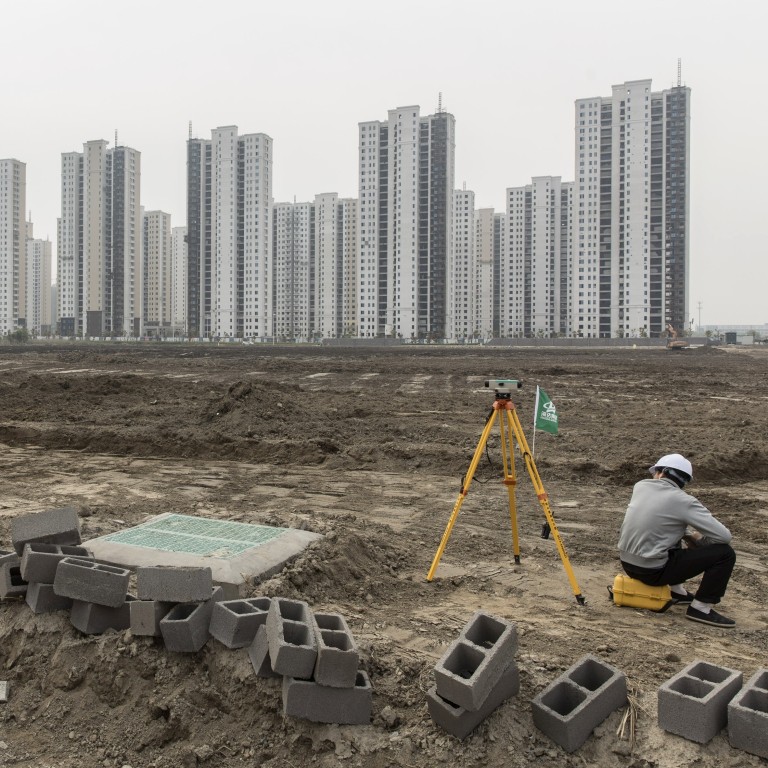
China property: tax authorities’ enhanced oversight of land-sale revenue seen as ‘mixed bag’, and runaway prices may drop
- New means of collecting revenue from land sales in China aims to help central authorities better trace the flow of funds and defuse debt risks at local levels
- Move means developers will have ‘less financial flexibility’ in buying land
A new plan that will require land-sale revenue in China to be paid to and managed by tax authorities rather than local-level land departments will be a “mixed bag for China property”, according to analysts, as Beijing moves to stabilise runaway home prices and defuse local financial risks.
The revamped collection method, which will allow central authorities to better trace the flow of funds, will be rolled out in a pilot programme from July 1 in seven regions, including Shanghai, Inner Mongolia, Zhejiang, Hebei and Yunnan. And it will be extended nationwide from next year.
Money in tax administration accounts are generally under the central government’s oversight, and thus off-limits for local cadres to use directly. However, the new set-up does not change the fact that land-sale revenue still belongs to local governments, and Beijing will not take a cut.
Citing the “mixed bag” implications, Raymond Cheng, head of Hong Kong and China research at CGS-CIMB Securities, said that land prices could be eased in the medium to long term, while a strict implementation of the new policy “will prevent developers from delaying payment of land premiums in the future by negotiating with local governments”.
“This means that developers will have less financial flexibility [in terms of] buying land,” he said.
Meanwhile, Cheng said, “local governments [will] have no big incentive to maintain the high land price policy going forward, which is currently one of the key sources for local governments’ spending. Under this new policy, local governments will have much less room to manage and to misuse those land revenues”.
“There will be no future for a local reliance on land sales. It’s unsustainable. Therefore, it is necessary to lower its proportion in fiscal revenues,” said Wen Laicheng, a finance professor at Central University of Finance and Economics in Beijing.
Land-sale revenue in China is now a major source of local off-budget revenue, with the value nearly tripling in the past decade to 8.4 trillion yuan (US$1.31 trillion).
Additionally, financing vehicles with deteriorating financial positions have been ordered to restructure or even liquidate, according to budget-management regulations released in early April.
We foresee fewer irregular practices, which may help prevent inflated land prices in some local government areas
“The central government will be able to obtain real-time data on local fiscal strength, which will help coordinate nationwide fiscal resources with transfer payments,” according to Shenwan Hongyuan Securities’ assessment on the medium-term implications, released on Monday.
And Peng Wensheng, chief economist at China International Capital Corporation, also said the new compliance measures will help curb refunding practices and accordingly affect land prices and the cash flow of local government financing vehicles.
“We foresee fewer irregular practices, which may help prevent inflated land prices in some local government areas,” he wrote in a research note.
As it strives to curb property speculation and runaway home prices, China’s leadership has taken steps that include wide-reaching purchase restrictions, mortgage restraints, financial requirements on developers, and affordable-housing programmes.
Nevertheless, second-hand home prices of tier-one cities such as Beijing rose 11.3 per cent in April, year on year, while those in tier-two cities rose 3.4 per cent, according to government data.
Land revenue is largely used to compensate property owners who have been subject to land expropriation, housing demolition, groundwork and maintenance – measures that are usually undertaken by financing vehicles or state-owned enterprises. Some of the land revenue is also used to repay debts and improve rural infrastructures, as shown in some local budget reports.
Ivan Chung, a senior analyst with Moody’s Investors Service, said investors are turning away from LGFVs in less-developed provinces, particularly those with high exposure to the land market. “The regulation will pose a new challenge,” he added.

